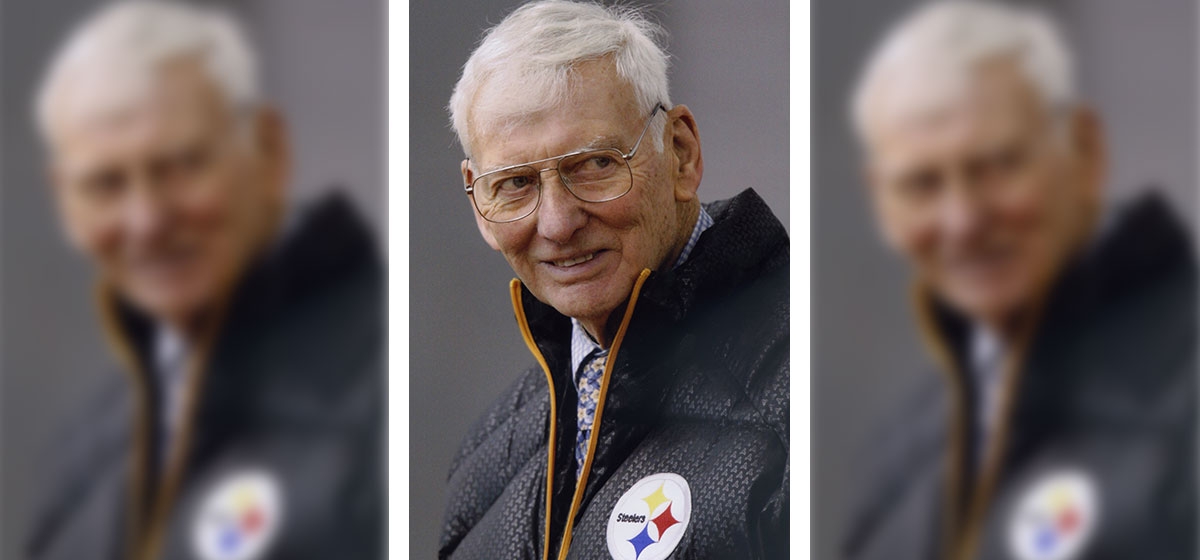Dan Rooney, Steelers Chairman and 30th United States Ambassador to Ireland

The Irish like to say ‘it’s a long way from Newry’—where my family comes from originally—‘to Phoenix Park,’ where I now live and work as the U.S. ambassador to Ireland. But believe me, it’s a much, much longer way to Phoenix Park from the North Side of Pittsburgh.
My life in professional football was always challenging and stimulating, and being an ambassador now is much the same. Representing the U.S. and President Obama is an honor, and I like to think that I brought a little of the friendliness and work ethic of Pittsburgh to the job with me.
Before leaving for Ireland, I held a press conference and explained that my objective would be to reach out to all of its people. I planned to visit every county and wanted to assure the Irish that America still cares.
In addition to our day-to-day work and official functions, we hold luncheons every couple of weeks or so to learn about each other. For example, Ireland is interested in learning more about our healthcare system, so we brought in a number of top medical people from the U.S., encouraged a dialogue, and then reported what we learned to the U.S. State Department. That’s part of my job.
Back in 2008, when some friends of mine were joining the Obama administration, many told me, ‘You would make a great ambassador, Dan, but ambassador to Ireland would be a really wonderful thing.’ I said, ‘Look, I campaigned for Barack Obama because I thought he was the best man for the job and that our country needed someone like him at this particular time. And I will continue to work as much as I can for him. But I’m not looking for anything.’ My friends, however, kept it up. Some wondered if maybe I could be considered for a post at the Vatican, but then the president called and asked if I would go to Ireland. I said, ‘You bet.’ So off I went. It’s true that I was very vocal about my support for Barack Obama during his campaign, for a couple of reasons. First, he’s a good person, and we need good people in government. Sure, we need people who are moral and have integrity, everyone knows that, but they have to have brains, too—and the president has the whole package.
During his first three years, he’s accomplished some things, and has done so quietly. He’s been willing to reach across the aisle to work with Republicans, but they are always down on him, which I suppose is nothing new. They blame him for everything. The oil spill in the Gulf, for instance. What did he have to do with that? And the financial crisis: He inherited that from the Bush administration. But I like the fact that he does what he has to do. Look, our country has some challenges ahead and our president is asking us to come together. Why can’t we do that?
Anyway, it seems that politics hasn’t changed much since my father’s time—but football sure has. In some ways, both suffer from similar ways of thinking. For example, the NFL had the player lockout last summer, which forced the league to deal with, among other things, the constant push for enhanced safety rules. When I think about the safety issue, I can’t help but remember that great picture of Hugh McElhenny, who was a running back for the 49ers in the 1950s, running full speed in the open field—without a helmet, his hair blowing all over the place. Look, football isn’t for everybody. It’s more physical than many other sports. Then and now, the league never wanted to see anyone get hurt on the field. But while the helmet today protects players better than ever from blows to the head, no one ever talks about it and the face mask, and how they’ve created a brand new safety problem by simply changing the way the game is played.
In the days of Hugh McElhenny, players didn’t lead with their heads to block and make tackles as players do today. Who would do that if their head wasn’t protected? The point is that improvements to the game on one hand can create new and sometimes bigger problems on the other. Now we have special shoulder pads and quarterbacks wear rib pads, all of which is good. And while no one should be slamming quarterbacks into the ground unnecessarily, remember that they are football players. You can’t give them jerseys that say ‘off limits.’ If you field 11 men, they have to be 11 men. Should we go back to the single-wing offense where the quarterback isn’t that important? I don’t think the players or the fans would like that very much.
Now, one problem in football—much as in government, by the way—is that nobody does anything until the 11th hour. The NFL negotiations started two years ago and I could see then that we had problems. First, people said, ‘Let’s get a deal by the Super Bowl.’ Then they said, ‘Let’s get a deal by March.’ And so on. But I knew from experience that we weren’t going to get a deal until time was about to run out. So when it came time to go to camp, we had a deal because we had to have one. If not, the teams wouldn’t have been ready and there might have been no season. Sound familiar? Just think back about the U.S. Congress and the raising of the debt ceiling. Anyway, as I said, I’m honored to be the U.S. ambassador to Ireland, but I’ll admit that I do miss football, attending all the games and talking with players, coaches and others involved with the sport. But I accepted this post gratefully, and I’m enjoying and making the most of it, even in the face of the rough time Ireland is going through right now. But if there’s one thing you can say about the Irish, it is that they are resilient. They’ve faced worse times in their history and, like Americans, they’ll make it. They always have.
Another big problem we have in the world in general these days is the influence of big money, and the NFL is no exception. When the league entered into its first television network arrangement way back when, the money was huge. We went from making like $150,000 a year to maybe $1 million—a big, big increase. Of course, we all were very happy about that. But my father said, ‘You’ll rue the day that this happened. Before long, these very entities will feel entitled to tell you how to run your business. TV people will be telling you how, when and at what time to play.’ And that’s where we are, pretty much.
Money never influenced my father’s decisions. He didn’t do things just because of how much he would earn. He did things because they were the right things to do. But let’s put it this way: In big-time sports —and again, like in politics—money is a necessary evil. The owners benefit from it and so do the players. And I still shake my head when team owners get upset if the players’ association says something like, ‘We are the game.’ I don’t get upset about it. The players are the game. We may be running the business end, but without the players, there would be no games. That’s the way you have to look at it. Now, it’s true that NFL franchises are pretty secure investments. The only thing I’ll tell you is that, if the owners took their money and put it in any number of non-football investments, most of the time they would reap more profit. So I’ve got to give some credit to the owners. Sure, they’re looking for a return on their investments, but they also love the game. If not, they wouldn’t be involved. I don’t know if my father ever thought football would get quite as big as it is today, but I’m reasonably sure that he would never have pegged me as a future U.S. ambassador. Still, it’s funny but, no matter where I go in the world, when people learn that I’m from Pittsburgh, the first thing they ask about is the Steelers. So I suppose the team is something like an ambassador for the city, and we’re very proud of that. I know that some people claim that, when we needed the new stadium about 10 years ago or so, we threatened to leave Pittsburgh if we didn’t get it. But that was just not true. We might have considered moving somewhere else in Allegheny County, but we never said we might move to another city, even for a better deal. The Steelers are a part of the city and belong to the people of Pittsburgh. I know my father wanted it that way.
You know, my father always believed in people, especially young people. That comes from a sense of community and wanting to do things right. It’s no accident that the Steelers have had only three coaches in the past 42 years, which is very unusual for the NFL. Chuck Noll was only about 34 when we brought him in, and Bill Cowher was only 35. Both are great leaders and tremendous people. Today, in Mike Tomlin, we have another young coach who is also excellent. You see, we have always believed that it was best to choose a capable young man and help him—and I don’t mean help him coach the team. We’re there to give him what he needs, to provide the support that is necessary to give him confidence. If we do that, we believe that we’ll always have something to build upon.
My heart is still very much in Pittsburgh, believe me. It is my home. I was born here and, when I’m not in Ireland, I actually live in the house where I was raised. It’s a fine house, 150 years old, on the North Side, close to the stadium. I used to walk to Three Rivers Stadium when our offices were there. Now I walk—or ride in a golf cart—to Heinz Field. I love to do that. It always brings back so many memories.





